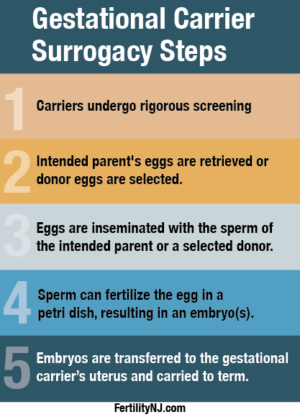Gestational Carrier Surrogacy Services for Intended Parents
Gestational carrier (surrogate)

A gestational carrier (surrogate) is needed when a woman cannot carry a healthy pregnancy to term,
or for same sex male couples who wish to build their family. The eggs (oocytes) of either the intended parent or an egg donor are inseminated with sperm of the male partner or sperm donor, fertilized, grown to embryos in a Petri dish and then placed into the gestational carrier’s uterus during an embryo transfer.
The reasons a woman may need a gestational carrier may be due to a hysterectomy (removal of uterus), uterine problem, recurrent pregnancy loss, or a severe medical condition that may put the mother and child at risk for severe complications of pregnancy. Usually the eggs of the biological mother are used, although if additional infertility issues exist, donor eggs or sperm may be used (the gestational carrier’s eggs are not used).
The gestational carrier is a healthy woman with a previous successful obstetric history who will carry the pregnancy to term and deliver the child for the intended parents. Patients may present a friend or family member as a potential gestational carrier, or a carrier agency can be used to match them to a candidate. All carriers are rigorously screened to ensure that patients will have an ideal outcome. Additional legal and psychological counseling is required to handle the intricate issues that are involved in these arrangements, both during and after fertility treatment.
Reproductive Science Center of New Jersey will coordinate the treatment of the intended parents and gestational carrier and continue the care of the gestational carrier for the first 7-8 weeks of pregnancy.
RadioMD “Fertility Talk” Podcasts
Dr. Alan Martinez explains how The Reproductive Science Center of NJ can help coordinate the care of the biological parents and gestational carrier for couples wishing to have children.
Gestational CarriersIntended parent
An intended parent is a patient who needs to utilize a gestational carrier (or surrogate) to carry a pregnancy to term. In the cases of same-sex male couples, or female patients who have a uterine abnormality, finding the right carrier is essential to their family building plan. Treatment options include doing IVF using one’s own eggs or eggs from a donor, with sperm from the male partner or a sperm donor. We will refer you to experienced carrier agencies that will help the patient find the right surrogate. We also manage the complicated legal process and provide patients with post-delivery support, while our medical staff manages the medical screening and treatment cycle here at our practice. RSCNJ offers the expertise and experience necessary to coordinate these multiple parties to achieve the goal of a healthy pregnancy.
